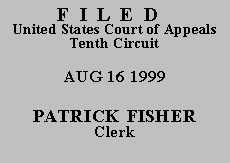

| BILL ROBERT CATHEY,
v.
GARY GIBSON and ATTORNEY
GENERAL OF THE STATE OF
OKLAHOMA, |
No. 99-7047
(D.C. No. CIV 98-CV-268-S) |
Here, Cathey filed his federal habeas petition in the United States District Court for the Eastern District of Oklahoma on June 8, 1998. The district court determined that, at most, the time for Cathey to file his federal habeas petition should have been tolled 122 days, which would have given him until the end of August 1997 to meet AEDPA's timing requirements. Because Cathey filed his federal habeas petition on June 8, 1998, the district court dismissed the petition as time barred. The district court also denied Cathey a certificate of appealability ("COA").
Before this court, in support of his application for a COA, Cathey argues that, in violation of the United States Supreme Court's decision in Houston v. Lack, 487 U.S. 266 (1988), the Oklahoma Court of Criminal Appeals erroneously concluded that his state postconviction application was untimely, which led the federal district court to conclude erroneously that his federal habeas petition was time barred. We find that Cathey's argument is without merit. Because he has failed to make a "substantial showing of the denial of a constitutional right," as required by 28 U.S.C. § 2253(c)(2), we deny Cathey's application for a COA.
The mandate shall issue forthwith.
ENTERED FOR THE COURT
David M. Ebel
Circuit Judge
*.After examining appellant's brief and the appellate record, this panel has determined unanimously that oral argument would not materially assist the determination of this appeal. See Fed. R. App. P. 34(a)(2) and 10th Cir. R. 34.1(G). The case is therefore ordered submitted without oral argument. This Order and Judgment is not binding precedent, except under the doctrines of law of the case, res judicata, and collateral estoppel. The court generally disfavors the citation of orders and judgments; nevertheless, an order and judgment may be cited under the terms and conditions of 10th Cir. R. 36.3.